Related Research Articles
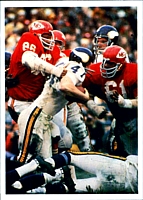
Super Bowl IV was an American football game played on January 11, 1970, at Tulane Stadium in New Orleans, Louisiana. It was the fourth and final AFL–NFL World Championship Game in professional football prior to the AFL–NFL merger taking effect the following season. The American Football League (AFL) champion Kansas City Chiefs defeated the National Football League (NFL) champion Minnesota Vikings by the score of 23–7. This victory by the AFL squared the Super Bowl series with the NFL at two games apiece as the two leagues merged after the game.

Super Bowl XVII was an American football game between the American Football Conference (AFC) champion Miami Dolphins and the National Football Conference (NFC) champion Washington Redskins to decide the National Football League (NFL) champion for the strike-shortened 1982 season. The Redskins defeated the Dolphins, 27–17, to win their first Super Bowl championship. The game was played on January 30, 1983, at the Rose Bowl in Pasadena, California.
Daryle Pasquale Lamonica was an American professional football quarterback who played in the American Football League (AFL) and the National Football League (NFL) for 12 seasons, primarily with the Oakland Raiders. Lamonica was drafted by the NFL Green Bay Packers in round 12 with the 168th overall pick. He spent his first four seasons mostly as a backup for the Buffalo Bills, who selected him in the 24th round of the 1963 AFL Draft. Lamonica played his next eight seasons as the primary starter of the Raiders, including after they joined the NFL through the AFL–NFL merger.
David Eugene Woodley was an American professional football player who was a quarterback in the National Football League (NFL) for the Miami Dolphins (1980–1983), and the Pittsburgh Steelers (1984–1985). He played college football for the LSU Tigers.

Robert Allen Griese is an American former professional football player who was a quarterback for the Miami Dolphins of the American Football League (AFL) and National Football League (NFL). He earned All-American honors playing college football with the Purdue Boilermakers before being drafted in 1967 by the Dolphins of the AFL.
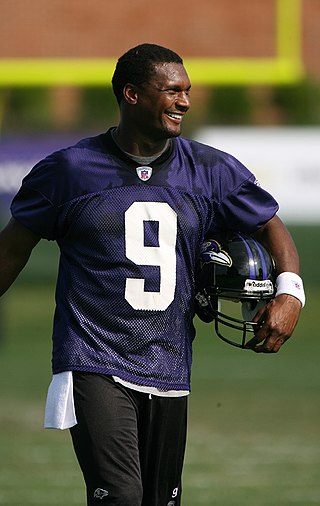
Stephen LaTreal McNair, nicknamed "Air McNair", was an American professional football quarterback who played in the National Football League (NFL) for 14 seasons. He started his first two seasons with the Houston Oilers before the team relocated to Nashville, Tennessee. There, McNair would become the first franchise quarterback of the Tennessee Titans. He also played for two seasons with the Baltimore Ravens.

The National Football League playoffs for the 1970 season began on December 26, 1970. The postseason tournament concluded with the Baltimore Colts defeating the Dallas Cowboys in Super Bowl V, 16–13, on January 17, 1971, at the Orange Bowl in Miami, Florida.
The 2003 NFL season was the 84th regular season of the National Football League (NFL).
Mike Shula is an American football coach who is the Offensive Analyst for the South Carolina Gamecocks of the Southeastern Conference (SEC). He played college football as a quarterback for the Alabama Crimson Tide and was the school's head coach from 2003 to 2006. He was the offensive coordinator for the Tampa Bay Buccaneers from 1996 to 1999, the Carolina Panthers from 2013 to 2017, and the New York Giants from 2018 to 2019.
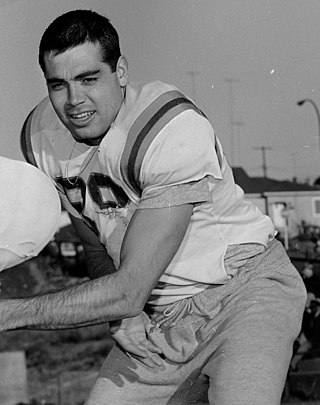
Joseph Robert Garcia Kapp was an American football player, coach, and executive. He played college football as a quarterback for the California Golden Bears. Kapp played professionally in the Canadian Football League (CFL) with the Calgary Stampeders and the BC Lions and then in the National Football League (NFL) with the Minnesota Vikings and the Boston Patriots. Kapp led the BC Lions to their first Grey Cup Championship victory in 1964. With the Vikings, he led them to victory in the 1969 NFL Championship Game, the only league championship in team history. Kapp returned to his alma mater as head coach of the Golden Bears from 1982 to 1986. He was the general manager and president of the BC Lions in 1990.

Chad Steven Henne is an American former professional football player who was a quarterback for 15 seasons in the National Football League (NFL). He played college football for the Michigan Wolverines, where he is the all-time leader in passing yards and touchdowns, with 9,715 yards and 87 touchdowns. He was selected by the Miami Dolphins in the second round of the 2008 NFL draft, and started multiple seasons over his NFL career, for both the Dolphins and Jacksonville Jaguars. He also won two Super Bowls with the Kansas City Chiefs, serving as the backup quarterback.
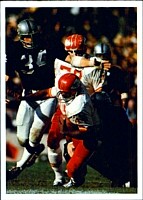
The 1969 Kansas City Chiefs season was the team's tenth, their seventh in Kansas City, and the final season of the American Football League (AFL). It resulted in an 11–3 regular season record and three postseason road victories, including a 23–7 victory in Super Bowl IV over the NFL's heavily favored Minnesota Vikings.

31 quarterbacks have started for the National Football League's Kansas City Chiefs since their franchise began. The team has also had numerous backup quarterbacks that have stolen the spotlight from the starters.
The Kansas City Chiefs are a professional American football franchise that began play in 1960 as the Dallas Texans. The team was a charter member of the American Football League (AFL), and now play in the National Football League (NFL). The team is not related to the earlier Dallas Texans NFL team that played for only one season in 1952.
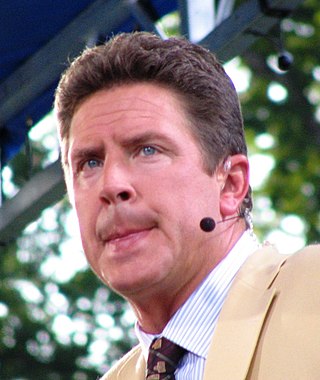
Daniel Constantine Marino Jr. is an American former professional football player who was a quarterback in the National Football League (NFL) for 17 seasons with the Miami Dolphins and has worked with them since 2014 as a special advisor. He played college football for the Pittsburgh Panthers, earning first-team All-American honors in 1981. Marino was the last quarterback taken in the first round of the famed quarterback class of 1983. He held or currently holds dozens of NFL records associated with the quarterback position, and despite never being on a Super Bowl-winning team, he is recognized among the greatest quarterbacks in American football history.

The Kansas City Chiefs are an American football team based in Kansas City, Missouri. The Chiefs compete in the National Football League (NFL) as a member of the American Football Conference (AFC) West division.
The 1970 AFC Championship Game was the inaugural title game of the American Football Conference (AFC). Played on January 3, 1971, the game was hosted by the AFC East champion Baltimore Colts who played the AFC West champion Oakland Raiders at Memorial Stadium in Baltimore, Maryland. Along with the 1970 NFC Championship Game played on the same day, this game constituted the penultimate round of the 1970–71 NFL playoffs which had followed the 1970 regular season of the National Football League.

Patrick Lavon Mahomes II is an American professional football quarterback for the Kansas City Chiefs of the National Football League (NFL). Mahomes has led the Chiefs to six consecutive AFC Championship Game appearances and four Super Bowl appearances since becoming the team's starting quarterback in 2018. He is one of five quarterbacks in NFL history to win three or more Super Bowls as a starter. Mahomes's career accolades through seven seasons in the NFL have earned him widespread praise from sports journalists, and he is considered to be one of the greatest quarterbacks of all time.
References
- ↑ "Super Bowl | History, Appearances, Results, & Facts | Britannica". www.britannica.com. 2024-11-13. Retrieved 2024-11-16.
- ↑ "Super Bowl History ‑ Facts, Stats and Highlights". HISTORY. 2023-02-10. Retrieved 2024-11-16.
- ↑ Deen, Safid. "Which NFL teams have never played in the Super Bowl? It's a short list". USA TODAY. Retrieved 2024-11-16.
- ↑ "How many teams have played a Super Bowl at home in NFL history?". FanSided. 2022-01-30. Retrieved 2024-11-16.
- ↑ "Super Bowl Standings". Pro-Football-Reference.com. Retrieved 2024-11-16.
- ↑ "Every Qb That Lost In The Superbowl". StatMuse. Retrieved 2024-11-16.
- ↑ "See every Super Bowl winner (and loser) since the first one in 1967". For The Win. 2024-02-12. Retrieved 2024-11-16.
- ↑ "Hall of Fame Chiefs quarterback Len Dawson dies at 87". NBC News. 2022-08-24. Retrieved 2024-11-16.
- ↑ "Prolific Raiders passer Lamonica dies at age 80". ESPN.com. 2022-04-21. Retrieved 2024-11-16.
- ↑ "Earl Morrall dies at 79; saved Dolphins' 1972 season". NFL.com. Retrieved 2024-11-16.
- ↑ "Kapp, former QB for Cal, Vikings, dies at 85". ESPN.com. 2023-05-09. Retrieved 2024-11-16.
- ↑ Archives, L. A. Times (2003-05-07). "David Woodley, 44; Former Dolphin Quarterback Was in 1983 Super Bowl". Los Angeles Times. Retrieved 2024-11-16.
- ↑ "Who Killed Steve McNair? The Details Behind the 2009 Murder-Suicide That Rocked the NFL". People.com. Retrieved 2024-11-16.
- ↑ "Super Bowl Standings". Pro-Football-Reference.com. Retrieved 2024-11-16.